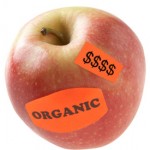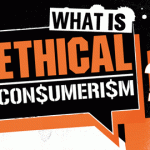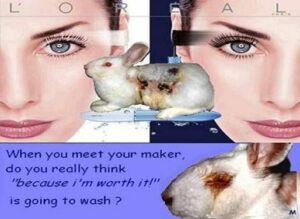 There is an unmistakable movement overtaking our culture that is so invigorating and innately humane that most respectable people cannot easily ignore the intuitive karma it beholds. Although the concept of being decent to one another is simplistic and straightforward, the movement has been labeled as many names which have often been misunderstood. You may have heard of veganism, organic living, ethical consumerism, fair-trade, or even cruelty-free.
There is an unmistakable movement overtaking our culture that is so invigorating and innately humane that most respectable people cannot easily ignore the intuitive karma it beholds. Although the concept of being decent to one another is simplistic and straightforward, the movement has been labeled as many names which have often been misunderstood. You may have heard of veganism, organic living, ethical consumerism, fair-trade, or even cruelty-free.
Although they are all unique constructs in their own ways, these movements share some common principles like that of being good, fair, and thoughtful human beings and extending a sense of common respect to all living things on this planet.Although you may think this has no place in business and little place in your salon, you may be well advised to think differently. Recent consumer studies clearly show that more and more women are making consumer driven decisions everyday and your 10 next best clients may be passing your salon by if you’re not careful.
First, we should review some basic terms…
Vegan or Veganism
Veganism is a philosophy and lifestyle whose adherents seek to exclude the use of animals for food, clothing, or any other purpose. Vegans endeavor not to use or consume animal products of any kind. The most common reasons for becoming a vegan are human health, ethical commitment or moral conviction concerning animal rights or welfare, the environment, and spiritual or religious concerns
Organic Products
 Organic products are made in a way that limits the use of synthetic ingredients especially those considered to be toxic or carcinogenic like ammonia, resorcinol, parabens, and potassium hydroxide . For the vast majority of human history, products can be described as organic; only during the 20th century was a large supply of new synthetic chemicals introduced to humans through the products they consume. This more recent style of production is referred to as “conventional.” Under organic production, the use of conventional non-organic ingredients is greatly restricted and saved as a last resort.
Organic products are made in a way that limits the use of synthetic ingredients especially those considered to be toxic or carcinogenic like ammonia, resorcinol, parabens, and potassium hydroxide . For the vast majority of human history, products can be described as organic; only during the 20th century was a large supply of new synthetic chemicals introduced to humans through the products they consume. This more recent style of production is referred to as “conventional.” Under organic production, the use of conventional non-organic ingredients is greatly restricted and saved as a last resort.
Cruelty Free
The cruelty-free movement has developed from veganism into a philosophy of life that aims to avoid all the products of cruelty to humans or animals. Products avoided include those that contain part of a dead animal or materials obtained from an animal by means of cruelty (such as keeping the animal in a confined space or separating mother from child etc.). Also avoided are products of child slavery and sweatshop labor.
Fair Trade
Fair trade is an organized social movement and market-based approach that aims to help producers in developing countries obtain better trading conditions and promote sustainability. The movement advocates the payment of a higher price to producers as well as social and environmental standards. It focuses in particular on exports from developing countries to developed countries. The underlying concept is to recognize the moral obligation to pay workers a fair wage for their efforts.
Ethical Consumerism
 Ethical consumerism is the intentional purchase of products and services that the customer considers to be made ethically. This may mean with minimal harm to or exploitation of humans, animals and/or the natural environment. Ethical consumerism is practiced through ‘positive buying’ in that ethical products are favoured, or ‘moral boycott’, that is purchasing avoidance. The rise in ethical consumerism and “green brands” that identify themselves as ethical, has led to a rise in ethic-based decisions in the mass market, enabled by increased understanding and information about businesses practices.
Ethical consumerism is the intentional purchase of products and services that the customer considers to be made ethically. This may mean with minimal harm to or exploitation of humans, animals and/or the natural environment. Ethical consumerism is practiced through ‘positive buying’ in that ethical products are favoured, or ‘moral boycott’, that is purchasing avoidance. The rise in ethical consumerism and “green brands” that identify themselves as ethical, has led to a rise in ethic-based decisions in the mass market, enabled by increased understanding and information about businesses practices.
Whether capturing a segment of the ethical consumer market, which studies show is one of the fastest growing markets in North America, or simply instilling a feel-good atmosphere in your salon, knowing your products will be very important. Like so much man-made merchandise, hair products can be loaded with animal products hiding behind the guise of long, unpronounceable names. Luckily, we’ve put together a list of chemicals to avoid and a few hair care suggestions to ensure that everyday is a good hair day in your salon.
Let’s evaluate these concepts in terms of the products your salon uses…
Permanent Hair Color
Ammonia is one of the more toxic chemicals used in hair products today. It has an infamous reputation for causing illness and ailments in stylists and clients alike. While some of our competitors claim to have eliminated ammonia from their hair color products, they simply have shifted the ammonia from the color itself to another product used with the color such as the “oiln delivery system” or post shampoo. Organic Color Systems is very proud that none of our products contain any ammonia.
 Animal testing has unfortunately become a standard practice in the hair, beauty, and cosmetics industry. Many companies, despite their pledges, promises, and representations of not testing on animals, have actually been caught doing so on mass scales. For example, L’Oreal, one of the world’s largest beauty manufactures, has a long history of performing unspeakable tests on animals in their relentless pursuit of profit. Please find links to demonstrate the outrage against L’Oreal for the inhumane and unimaginable treatment of innocent and defenseless animals that it has been conducting for so many years. Organic Color Systems is proud that none of our products have or will ever be tested on any animals regardless of the profit potential.
Animal testing has unfortunately become a standard practice in the hair, beauty, and cosmetics industry. Many companies, despite their pledges, promises, and representations of not testing on animals, have actually been caught doing so on mass scales. For example, L’Oreal, one of the world’s largest beauty manufactures, has a long history of performing unspeakable tests on animals in their relentless pursuit of profit. Please find links to demonstrate the outrage against L’Oreal for the inhumane and unimaginable treatment of innocent and defenseless animals that it has been conducting for so many years. Organic Color Systems is proud that none of our products have or will ever be tested on any animals regardless of the profit potential.
Naturewatch Campaign to Boycott L’Oreal
PETA’s Caring Consumer/Cruelty Free Database on L’Oreal Animal Testing
L’Oreal Still Testing on Animals
 Finally, while many companies are switching their production resources to China, India, and third world countries to save labor costs and pay employees an unfairly low wage for their hard work, Organic Color Systems is proud to be manufactured in England where our employees enjoy a comfortable and fair wage for their excellent work in manufacturing, researching, and developing our fabulous product line.
Finally, while many companies are switching their production resources to China, India, and third world countries to save labor costs and pay employees an unfairly low wage for their hard work, Organic Color Systems is proud to be manufactured in England where our employees enjoy a comfortable and fair wage for their excellent work in manufacturing, researching, and developing our fabulous product line.
Shampoo
The next time you’re lathering up your client at the shampoo bowl, check the back of the bottle for Hydrolyzed Animal Protein, which is mostly derived from cows, pigs, and chickens. In shampoo, it’s used to add gloss or reduce split ends. Luckily, all of Organic Color Systems line are vegan products and we do not contain any ingredients derived from animals or animal byproducts. While we do have some synthetic ingredients, most of our ingredients are naturally derived from plants. Organic Color Systems uses the highest amount of Certified Organic Ingredients, with the lowest amount of synthetic ingredients, while still maintaining the exceptional, superior performance our product line is known for.
Conditioner
Conditioner provides your client’s hair with the strength to be healthy and voluminous as it closes the cuticle and protects the hair shaft—but can also be full of animal derivatives. Stearic Acid, sometimes derived from cows, sheep, dogs, and cats can be found in conditioner. The same goes for steroids, often derived from animal glands and also used in hair conditioners. We believe that the most ethical conditioner available on the market today is Organic Color Systems’ Status Quo, Power Builder, and Aqu Boost conditioner and treatment products.
Styling Products
The styling finishing touches give your styles a little extra oomph for your clients. But from hairspray to mouse, finishing products are often not vegan. For a 100% vegan line, which maximizes the amount of certified organic ingredients while minimizing the amount of synthetic ingredients while still maintaining exceptional professional performance, we recommend Organic Color Systems’ Care line.
Summary
In building your salon’s culture, ethos, and image; an owner or manager must consider the social, environmental, and toxic impact that it will most certainly be judged by in our age of the ever informed, conscious, ethical, and considerate consumer. People will pay a premium for good service that they feel good about. There is a very finite limit to the premium that your client’s will pay for good service they feel badly about. It is as important to your financial best interest, as it is to your well-being, to provide great service that people feel great about and enjoy the premiums for doing so while you enjoy long standing relationships with many loyal clients for years to come. After all, didn’t most of us decide tinwork behind the chair because we loved to interact and surround ourselves with other good people? In the salon industry YOU CAN DO WELL BY DOING GOOD!




